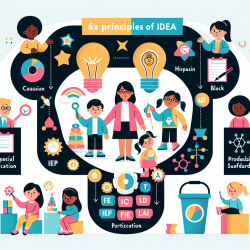Introduction
As a speech-language pathologist committed to fostering optimal developmental outcomes for children, the importance of evidence-based practices cannot be overstated. The recent study titled "Testing the impact of a social skill training versus waiting list control group for the reduction of disruptive behaviors and stress among preschool children in child care" provides valuable insights into how structured interventions can significantly benefit young learners, particularly those in underprivileged settings.
Understanding the Study
This research employed a cluster randomized control trial (cRCT) to evaluate the effectiveness of a social skills training program on preschoolers' behaviors and stress levels. Conducted in 19 public child care services (CCS) in Montreal, Canada, the study targeted 362 three-year-old children from low socioeconomic backgrounds. The intervention group received bi-weekly social skills training over eight months, focusing on:
- Making social contacts
- Problem-solving
- Emotional self-regulation
- Emotional expression and recognition
Key Findings
The study's findings are compelling, showing that children who participated in the social skills training exhibited:
- Reduced disruptive behaviors such as aggression and opposition
- Increased prosocial behaviors like sharing and helping
- Improved stress regulation, as indicated by more stable cortisol levels
These outcomes underscore the potential of structured social skills programs to create more harmonious and supportive learning environments in child care settings.
Implications for Practitioners
For practitioners, the implications of this study are clear: integrating structured social skills training into early childhood education can lead to significant improvements in children's social interactions and stress management. This is particularly crucial for children from low SES backgrounds, who may face additional challenges in developing these skills naturally.
Practitioners are encouraged to consider implementing similar programs within their own settings. The success of the intervention highlights the importance of consistent, structured approaches to social skills development, which can be adapted to fit the unique needs of different child care environments.
Encouraging Further Research
While this study provides a strong foundation, further research is needed to explore the long-term impacts of social skills training on children's academic and social success. Practitioners can contribute to this growing body of knowledge by documenting and sharing their own experiences and outcomes from implementing similar interventions.
Conclusion
In conclusion, the integration of social skills training in child care services is a promising strategy for reducing disruptive behaviors and stress among preschool children. By adopting evidence-based approaches, practitioners can enhance the developmental trajectories of the children they serve, particularly those in underprivileged communities.
To read the original research paper, please follow this link: Testing the impact of a social skill training versus waiting list control group for the reduction of disruptive behaviors and stress among preschool children in child care: the study protocol for a cluster randomized trial.










